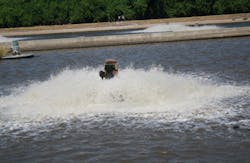According to a report from market research and analysis firm Frost & Sullivan, the wastewater aeration systems market is likely to see dramatic growth of up to 72 percent by 2020 and is estimated to reach a total global value of $8.39 billion. The market growth will be fueled by rising demand for secondary wastewater treatment services in developing markets and the need to upgrade existing infrastructure in mature markets, the company said.
Aeration is a biological method applied in the secondary stage of wastewater treatment, which is used in the activated sludge process by wastewater treatment facilities across the globe because of its reliability. As the method gains more popularity, its increased significance drives demand and innovation but regional differences will remain largely unchanged because of the varied expenditure on infrastructure development in individual countries, the Environmental Leader website reported.
Frost & Sullivan noted that the global aeration systems market recorded revenues of $4.88 billion in 2011 but this is predicted to almost double as the technology penetrates in developing countries. However, in many developed countries that have been using aeration for years, the infrastructure has been aging and is in a condition that requires replacement and upgrade, the author of the report, environmental research analyst Bhooma Madhavan, said. The biggest growth is expected in the diffused aeration technology segment, the report also noted.
At the same time, more stringent environmental regulations across all monitored regions suggest that the use of aeration systems will be given a significant boost over the next few years. A series of new laws, such as the Urban Wastewater Treatment Directive in the European Union, is set to push up demand for aeration equipment in treatment facilities, the report predicted.
The biggest concern for the sector remains the fact that aeration is an energy-intensive technology, which could prove a problem, especially in light of the rising energy prices on a global scale. This leaves aeration exposed to risks coming from alternative technologies that are more sustainable. On the plus side, this could lead to higher competitiveness and drive innovation in the segment, the report said.
Consumers will be focusing on aspects such as energy efficiency, price, technology and reliability, so producers and developers of aeration systems should focus on improving these characteristics of their products to remain competitive, Frost & Sullivan found. Knowledge and focus on local business practices and needs, local regulations and an understanding of market priorities will also play a significant role, as local producers of the technology gain a larger market share, especially in developing countries, Madhavan commented.
According to another report, released by Frost & Sullivan in November, stricter environmental regulations on discharge processes and disposal, as well as increasing awareness of sustainability issues in various geographical regions, will lead to growth in the industrial sludge treatment chemicals market, pushing sales in Western Europe from $1.02 billion in 2011 to $1.3 billion in 2018.
